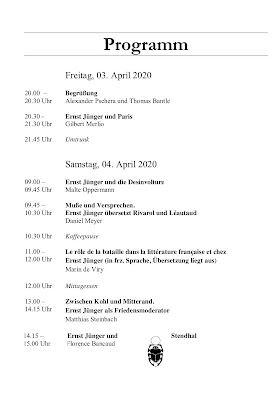We aspire to an objective, practical understanding of Ernst Jünger's life and works, and encourage other seekers of freedom and self-realisation to join us. Jünger's insights can function as a valuable roadmap to freedom and meaning for individuals in today's social and spiritual landscape. Crucial is his figure of the autonomous and inwardly-free anarch (in contrast to the impotent and self-destructive anarchist) as presented in his important novel EUMESWIL.
November 24, 2020
July 24, 2020
Ernst Jünger's 'Forest Passage' | The American Conservative
Ernst Jünger’s ‘Forest Passage’

After I gave my speech last week in Rome, someone came up to me and said, “You have to read The Forest Passage by Ernst Jünger.” I wish I could remember who told me that, but I do remember that they were emphatic. So I ordered it on my Kindle that night from my hotel room, and read it on the flight home.
It’s pretty great. Jünger is one of those writers I’ve heard a lot about, but never read. He died in 1998, at the age of 102. The German fought for the Kaiser in World War I, wrote a celebrated memoir about it, and was wooed by Hitler, though he kept his distance, and even wrote a novel that was widely interpreted as anti-Nazi. Yet he fought for his country in World War II. He was a conservative, but not a Nazi. He wrote a number of books, and became well-loved throughout Europe, especially in France. He came from an unbelieving family, but converted to Catholicism two years before his death.
The Forest Passage, first published in 1951, is a book about resistance to the material age, and authoritarian government. It’s kind of mystical, in a very German Romantic way, which is a bit too much Schlag on the strudel, but this is a minor criticism. This passage by Russell Berman from the introduction to the 2013 Telos Press edition gives you a good idea of where Jünger is coming from:
Religion is important for Jünger because it taps into dimensions of irrationality and myth, the deep wisdom at home in the forest. It is not that Jünger proselytizes or engages in theological speculation, but he recognizes how irrational contents nourish the capacity for independence. No wonder the regimes of power celebrate the cult of reason instead. “How is man to be prepared for paths that lead into darkness and the unknown? The fulfillment of this task belongs chiefly to the churches, and in many known, and many more unknown, cases, it has effectively been accomplished. It has been confirmed that greater force can be preserved in churches and sects than in what are today called worldviews—which usually means natural science raised to the level of philosophical conviction. It is for this reason that we see tyrannical regimes so rabidly persecuting such harmless creatures as the Jehovah’s Witnesses—the same tyrannies that reserve seats of honor for their nuclear physicists.” It is worth noting how the two twin totalitarianisms of the twentieth century each posed as the carrier of a scientific mission: the biological racism of Nazism and the economic “science of Marxism- Leninism” in Communism. From our contemporary point of view, of course, neither is a science, but Jünger’s point is that modes of scientistic thinking are fully compatible with reigns of terror, while the integrity of faith may preserve a space of freedom, a leap of faith into the forest passage.
January 27, 2020
Various/verschiedene Ernst Jünger Videos
Nachdem ich die englischen Untertitel für die neue ARTE / rbb-Dokumentation auf Jünger erstellt hatte, habe ich einige Zeit damit verbracht, die älteren Dokumentarfilme und Gespräche, die sich bereits auf meinem Kanal befanden, erneut hochzuladen, jedoch in einheitlicher und nicht aufgeteilter Form.
ENGLISH
"Ninety flown by: the author Ernst Jünger" - NDR/ORF 1985
DEUTSCH
"Neunzig Verweht - der Schriftsteller Ernst Jünger" - NDR/ORF 1985
"Ich widerspreche mir nicht - Ernst Jünger" - ZDF/3SAT, 1977
"Baden Badener Dichterclub über Ernst Jünger" - mit Rolf Hochhut, Ernst Herhaus, Jürgen Lodermann, und Klaus Theweleit. (Jahr?)
January 22, 2020
"In the Trenches of History: the author Ernst Jünger" - 2019 documentary with English subtitles!
One of the better documentaries on Ernst Jünger, this relatively more balanced production is unfortunately only a partial picture - and not in the sense of being skewed by the usual ignorance level and prejudices - but because it barely covers until 1960, until his move to Wilflingen.
It thus entirely leaves out the critical mature works and themes of Jünger: Eumeswil and the anarch, the Forest Flight (Der Waldgang), The Wall of Time (An der Zeitmauer), Aladdin's Problem, Approaches: Drugs and Inebriation, and much more. In this respect, we optimisticslly view it as Part One, and hope for at least a Part Two to come.
The film presents contrasting views on Jünger from Germanistic professors and other experts. The fairest and most informed contributions come - quite logically - from the two real experts, his recent biographers Heimo Schwilk and Helmuth Kiesel. Some of the other "experts" voice the usual cliched complaints but then almost visibly reluctantly admit his literary greatness. Naturally, it is a simplification of a highly complex person, but perhaps more should not be expected in one hour, given the length and eventfulness of Jünger's life and the complexity of his thought.



